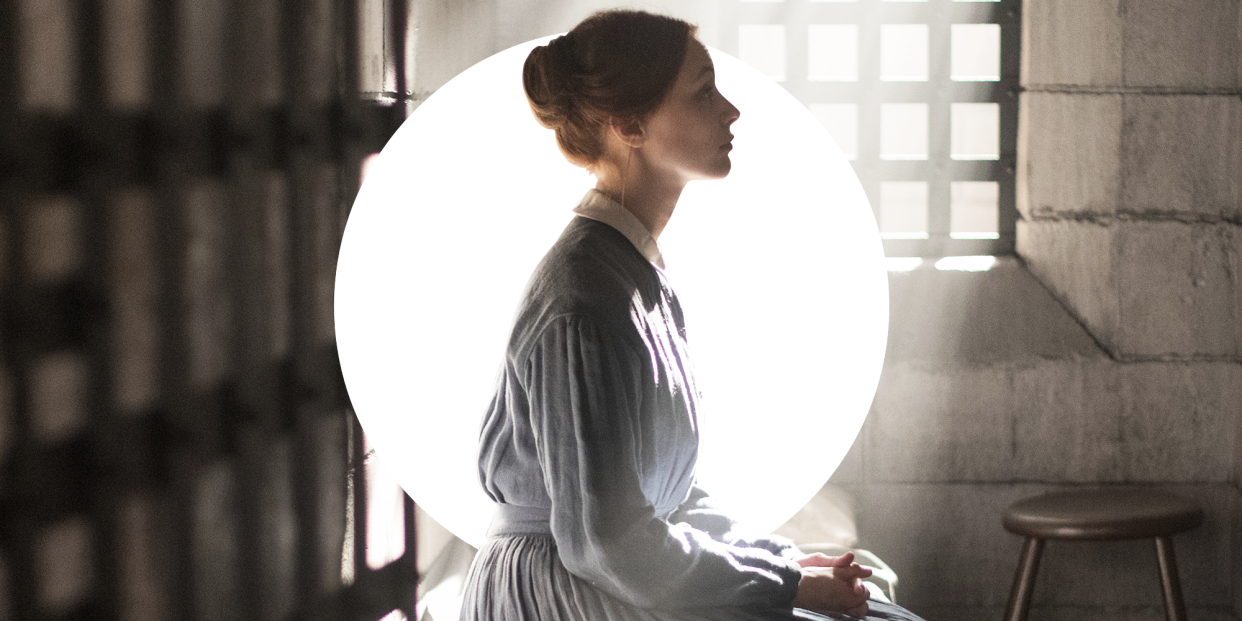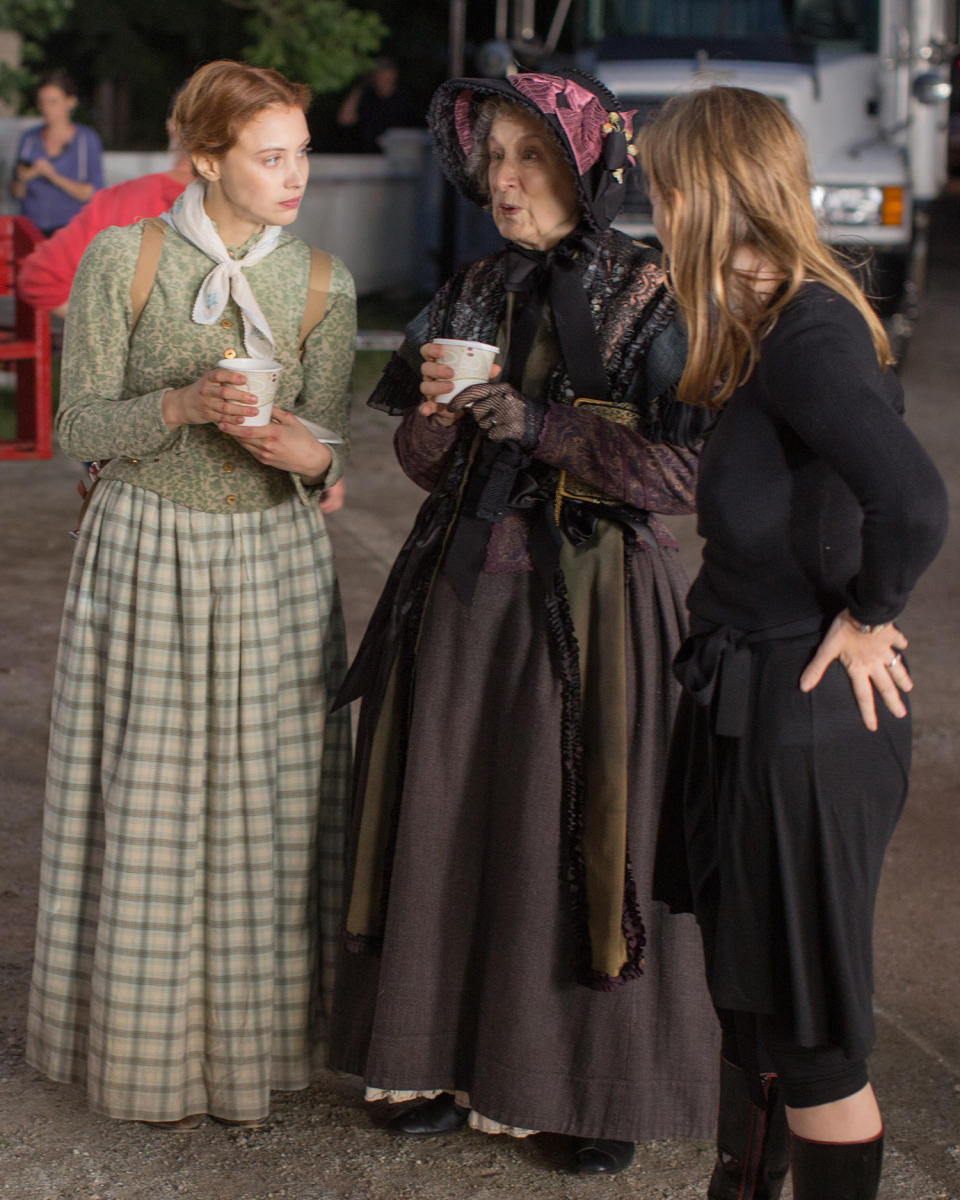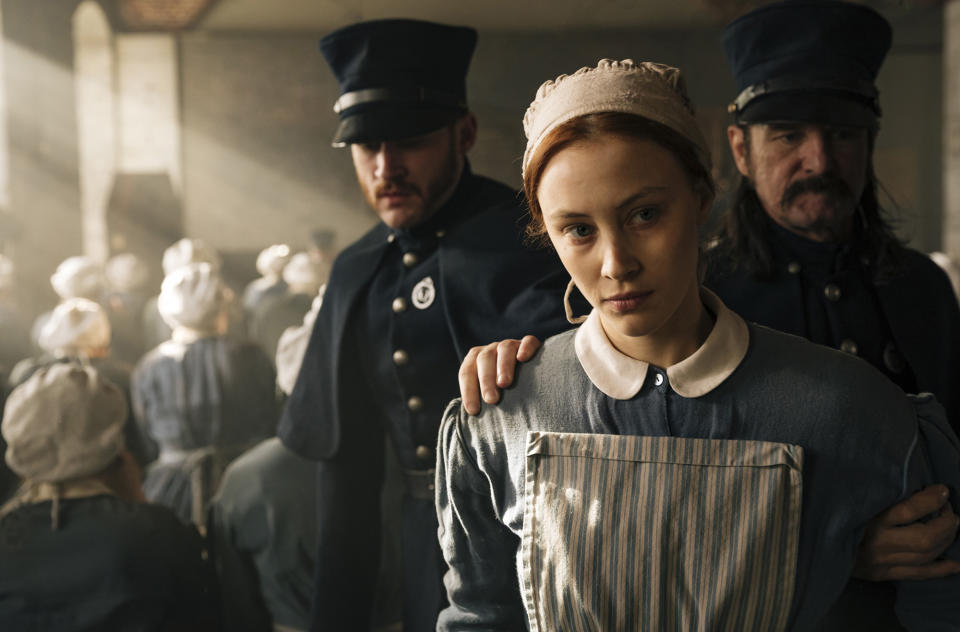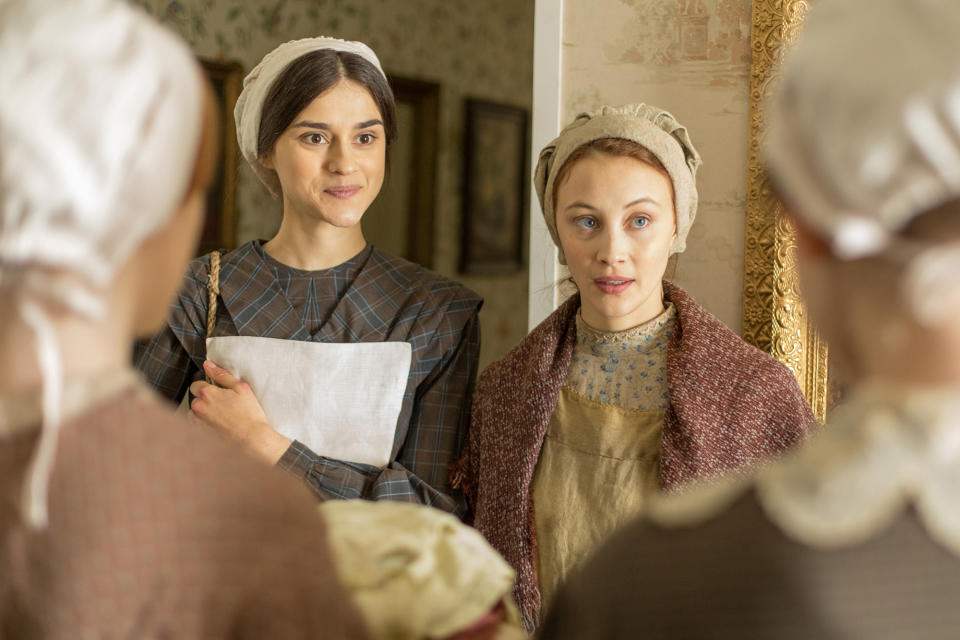Sarah Gadon Captures an Enigma in 'Alias Grace'

Netflix’s Alias Grace is not your average murder mystery. For starters, it’s based on a Margaret Atwood novel, which in turn is based on the grisly 1843 murder of a wealthy Irish-Canadian landowner, Thomas Kinnear, and his housekeeper, Nancy Montgomery. Kinnear’s servants, James McDermott and Grace Marks, were convicted of the crime, and while the former hanged, the latter received life imprisonment and national status as a "celebrated murderess." Neither of the convicts’ accounts of what happened to Kinnear and Montgomery ever aligned, and to this day, no one knows exactly how their deaths came to be.
That’s fascinating stuff in its own right, but this is Margaret Atwood’s narrative, and she was never interested in getting to the bottom of a whodunnit. Instead, her gripping 1996 novel imagines visits between Marks and a fictional psychiatrist (one Dr. Simon Jordan, tasked with determining Grace’s innocence or guilt) to explore the perception versus reality of women's roles within Victorian society and the ways women survive - or perish - within a patriarchy. Those themes drive the Netflix miniseries, one of those rare adaptations that is wholly respectful, almost reverent, of its source material. The show retains much of Atwood’s writing in its dialogue and Grace’s voiceover, exploring the unique horror of life as a young female immigrant in 19th-century North America while recounting the multiple, disparate narratives surrounding the Kinnear and Montgomery murders.

At the series' center is 30-year-old Canadian actress Sarah Gadon, whom writer Sarah Polley and director Mary Harron tasked with bringing the multifaceted, enigmatic Grace Marks to life. Gadon's months of preparations - learning to churn butter and sew (Gadon made the quilt you see at the end of the show), obsessively re-reading the source material, drilling with a dialogue coach to perfect an Irish accent - yielded one of the strongest TV performances of the year. Gadon plays 25+ years of Grace's life with preternatural ease, capturing a terrified preteen burying her dead mother in the middle of the Atlantic as convincingly as a middle-aged housewife. Her story is anchored in the interviews with Dr. Jordan, where Gadon combines remarkable wisdom (you get the sense she is an old woman wearing the face of someone younger) with the fast-talking, almost childlike enthusiasm of a person whose story has lived inside for far too long.
Below, Gadon discusses her journey to finding Grace Marks, grappling with the question of her guilt, and the show's premiere in the midst of the Weinstein fallout.
Harper's BAZAAR: What was your relationship to the story before you signed on to the project? Did you know anything about Grace Marks or Alias Grace before?
Sarah Gadon: I didn't know about Grace Marks, I didn't know who she was. I picked up the book before meeting with Sarah and Mary because I thought I should read a couple of pages, then ended up reading all of it because it's a real page turner. I'm so compelled by her. When I started preparing for the part initially, I got so wrapped up in the question of her innocence. I had to untangle myself from that, because Margaret, one of her main pieces of advice before we went to camera was, "It's so important to maintain the ambiguity. You have to do that in order to honor her memory, and honor this exploration of her." That was an important piece to the puzzle. It's not trying to crack her. It wasn't my job to crack her. It's kind of your job, as a viewer, but it's not really up to me, and it's okay to play different versions of her. There are so many different versions of her story that co-exist in the novel. There's McDermott's account, there's her account, there's Kinnear's account, there's what happened in court. And what Margaret did in writing the novel was use each piece of factual evidence to weave together this story. So, the in between - it's okay if it's not clear.
“As women, we're always in negotiation with how we're being perceived versus how we feel.”
HB: It's not your job to find an answer, but you do have to make some sort of convincing argument. How did you get there?
SG: Mary and I decided we were going to do different versions of Grace in the Simon and Grace interviews. We decided there was going to be the guilty Grace, the innocent Grace, and the more kind of neutral, guarded Grace. We did a take of every version, and then it was something she put together in the edit. That was a real exercise of trust, to say, "Okay, I'm going to hand over all these different performances and you're going to piece them together." I think that's also in the writing. There are moments where she's so clearly guilty, and then moments where she's so clearly innocent. So, it wasn't even something that we fabricated. It was more being honest to the writing. Then, in the flashbacks, it's not about concealing truth. It's about the experience of the young Irish girl who's immigrated to Canada, and what is it like to have a best friend? What is it like to be afraid about your future, and your life? What is it to experience an abortion with somebody? All of those things are real, and all of those motivations are clear. So, as much as there's the ambiguity in terms of her guilt, I feel like in the show, I get to experience a real kind of person, not an idea.

HB: You're playing her through much of her lifetime, from around 14 to her mid-40s. How do you encapsulate one person over such a long period of time?
SG: It was really tough, but what made it doable was we shot based on location. We didn't bounce around. Because the story's not chronological, it didn't really serve anybody to shoot script pages. We shot based on location, so we did Parkinson's house [where Grace first worked when she arrived in Canada], Kinnear's house, and we finished with the scenes between Simon and Grace, which was so great because I felt as though I had lived through everything. But Mary and I read a lot. We talked a lot about what it was like to be a woman at that time. We read Mrs. Beeton's Book of Household Management, which is about being a housemaid and the structure of the house, but there's so much you can glean from the way women wrote it during that period. They weren't supposed to have any opinions, they weren't supposed to have any authority about anything. So even though they're writing about things they are very qualified to write about, they're constantly apologizing for their perspective.
HB: Grace spends most of the show in the presence of Dr. Jordan, which whom she's very no-nonsense; for example, she reprimands him for suggesting she slept with Kinnear. Is it just that she has nothing to lose at this point?
SG: Mary and I talked about the idea of her speaking from this posthumous place, in the sense that it's almost as if she's died. It's interesting when you talk about women becoming infamous, or being of canonized as icons. That happened to her at such a young age. The trial was so sensationalized. Everything about her was completely ripped from her, and taken away in this crazy media frenzy. So, how does a person behave when they have nothing to lose? Mary introduced that notion of Grace being dead already, and I thought it added this layer of - it's not even rebelliousness, because if you're rebelling against something you have something to hang onto - but almost like a detachment, and a calmness of being able to say, "I have already died. My life is already over." Which it was, when she's in prison.
HB: You're an actress, you've put your life on public display, in some manner. Her story's been sensationalized across every newspaper in Canada. Did you relate to her?
SG: I definitely related to her, but I don't know if it's as straightforward as the fame conversation. I definitely thought, "Sarah [Polley] must have read this when she was 17, at a time in her life when she was trying to assert her voice, claim her identity." When I read it, I really connected with Grace for the same reasons, but also because when you're an actor, there are so many different versions that co-exist within yourself, and you're always in constant dialogue with your interior self versus your exterior self: how you look, and how you're perceived, and then people's preconceived notions of you. There have been so many times where I've been in a meeting or something, and I'm aware of how I look: I have blonde hair, and blue eyes, and I have a childlike face. And people have been considering me for roles where I'll be super innocent, I'll come and talk about the character very objectively, and intelligently, and then they'll be like, "Oh, we just think she can't access that place." It's like, you, well you did before I opened my mouth! There are so many cases like that, for all actors. I know that is not just unique to me, but I think that especially as women, we're always in negotiation with how we're being perceived versus how we feel, and sometimes that aligns and sometimes it doesn't. That's something that's universal to our experience.
HB: You called Alias Grace the "most complicated, intelligent" project you've ever worked on. Does that have anything to do with the women leading it behind the camera?
SG: I think it really starts with Margaret. She gets inside people's head and it has a way of expressing both the violent, but also the extremely subtle, experiences that we have as women. I've always loved that about her writing. I remember when I read Cat's Eye for the first time, I was blown away by how she was able to capture what it feels like to be bullied when you're a kid but not able to fully articulate, or really understand, what's going on. When you read Grace, there's things she says that resonate so deeply with you. So much of the show, and so much of what Grace says, is lifted from the pages of Margaret's book, so I knew from a dialogue perspective, it's a privilege to sit here and say these things. But also, I think the way Sarah adapted it was really intelligent. She adds this layer of female subjectivity in cinema that elevates the source material. The opening sequence of Grace looking in the mirror, that's not in the book, but she takes this image of a woman looking in the mirror, which we've seen over and over in our history in film, and she says, "Now, Grace is going to sit comfortably in every projection that she's ever experienced, and it's going to be unsettling to the audience, but it's also this invitation into female subjectivity." And that stuff, that's unique to women making images, and that's what's really powerful about that. I think it's really the combination of what this project is about, what this project is, and who told it. It's like all the stars aligned.
"When a character touches you in a way that is deeply personal, that's your way in."
HB: When I watched the first scene for the first time, I thought, "This is not easy to do. To look into a mirror and act to yourself." That's inherently uncomfortable.
SG: No, and it's something that I didn't like when I read it, and I asked Mary at one point to cut it. Before we went to camera I said, "Can we cut this? I don't get this. How is she going to really inhabit all these different things?" And they were kind of like, "Well, let's talk about it." Sarah was like, "We're not cutting it." It's that moment where you look in the mirror and it's not about being pretty. It's about where you think about yourself, and you're experiencing yourself, and you're experiencing all the things you've ever heard about yourself, and things that you don't like about yourself. So, it became this subtle thing that we've actually all done before. Mary decided to shoot it in a way that I recorded the voiceover, and then she played it while I was doing it so that it felt very intimate. Thank God we found a way around it. [Laughs] When I watched the show, I was like, "Oh, I get it."

HB: Obviously, you can't control the news climate in which a show debuts. But Alias Grace really turns the male gaze on its head. You have all these men recounting their versions of who Grace is, but no one ever knows the truth. And in the real world, these hugely powerful men who have controlled the narrative for so long are falling from their platforms.
SG: I think it's really pointed that both Alias Grace and Handmaid's Tale came out in the same year. People are like, "Isn't it a coincidence?" And I'm like, "Is it?" We're sitting at a point in history where we feel a tremendous amount of anxiety about where we're potentially headed in terms of gender policies, and that's what the Handmaid's Tale addresses. We're also still dealing with reproductive rights, and how we treat immigration, and a look back at Alias Grace is really where we've come from when we had no rights. There's a tremendous amount of anxiety, and I think that having those two pieces coexist is meaningful, and you have to look for those threads.
Then in regards to the whole Weinstein news cycle of sexual harassment and abuse, and finally there being a public space to talk about it where women are not shamed, and have a safe place and are finding a community of support, [this] coexists with the notion that Handmaid's Tale and Alias Grace are on streaming platforms, which have become extremely powerful places where women are having a voice, and not only are they having a voice in a couple of theaters, for a limited run, [but] 100 million people can click on our show today. That's really powerful. Who knows if Reed Morano [The Handmaid's Tale executive producer and director], or Mary, or Sarah would have had the chance be that loud? It's powerful and meaningful because people are claiming their voice in such a positive way in light of such negative events. We don't have to apologize for it, either. I don't have to say, "Sorry, I know you had a female-driven Margaret Atwood story earlier this year. I hope you're not bored." Which is a real concern [in the industry]. But it's not like that. The responses we've been getting from the show have been so positive, in a way that makes me really hope.

HB: Are you interested in producing or directing?
SG: I think this process was really unique and different, because Mary and Sara were so inclusive of me, and invited me into the edit, and invited me into the sound spotting, and let me in on so much of the process in a way that I'd never seen before. I don't know if that was something they did instinctually, or something they did purposefully because that door isn't necessarily wide open to women, so I think I'm interested in having control over my voice, and I'd be interested in what kinds of stories get made, and what kinds of stories I'm a part of. So, yes. But then there's also something about Sarah [Polley] living with something. She read the book when she was 17, I think, and tried to option it then. I think there's something about living with a piece of material, and letting it turn over in your head and inside of you for decades. She has a kind of intimacy, and this relationship to it, that she had been thinking about for so long. I think that is something really unique and special. It's not as if she was hired to write the adaptation. I don't know if I have a story I'm burning to tell right now. There are things that are kind of germinating right now within me that I'm like, "I want to do this. One day I want to do this."
HB: What's next for you?
SG: I did a part in Xavier Dolan's film, The Death and Life of John F. Donovan, which was really great. I loved working with him, he's so fantastic. I think because he's an actor he has a real vested interest in the tone on set. So, he's walking around playing music out of a boom box, and he feels like he's in the scene with you. That was really incredible. Then, I'm not sure. It took me a long time to get out of Grace. And I haven't really found anything, as of yet, that has really made me want to go back to work in that way, which I think is okay.
Alias Grace is streaming on Netflix now.
This interview has been edited and condensed for clarity.
You Might Also Like

